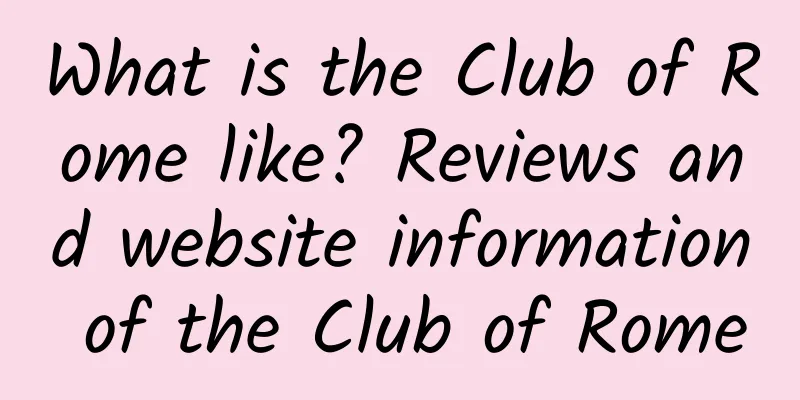What is the Club of Rome like? Reviews and website information of the Club of Rome

|
What is the Club of Rome website? The Club of Rome is a famous global think tank organization, founded in 1968 by Italian scholar and industrialist Aurelio Peccei and British scientist Alexander King. Its strong negative view makes it a representative of "futurist pessimism". Its purpose is to improve the public's global awareness through systematic research on global issues such as population, food, industrialization, pollution, resources, poverty, education, etc., urge international organizations and relevant departments of various countries to reform social and political systems, and take necessary social and political actions to improve global management and free mankind from the difficulties it faces. Website: www.clubofrome.org The Club of Rome: A pioneering think tank on global issuesIn today's era of deepening globalization, the challenges facing human society are becoming more complex and severe. From population growth to resource depletion, from environmental pollution to poverty and educational inequality, these issues have transcended national boundaries and become issues of common concern to all mankind. Against this background, a global think tank called the Club of Rome came into being. Since its establishment in 1968, the Club of Rome has become one of the important platforms for discussing global issues with its unique perspective and far-reaching influence. The Club of Rome was co-founded by Italian scholar and industrialist Aurelio Peccei and British scientist Alexander King. This non-governmental, non-profit international organization is dedicated to studying and solving major challenges facing human society. Its core goal is to raise public awareness of global issues through systematic analysis and forward-looking thinking, and to urge governments and international organizations to take necessary actions to improve global governance and promote sustainable development. As an independent research organization, the Club of Rome is not affiliated with any country or political group. Its members come from all over the world, including scientists, economists, entrepreneurs, politicians and experts in other fields. Through interdisciplinary cooperation, these members jointly explore how to deal with key issues such as population, food, industrialization, pollution, resources, poverty and education. The official website of the Club of Rome ( www.clubofrome.org ) provides the public with a wealth of information resources, allowing people to have a deeper understanding of the organization's mission, research results and its influence on the world. The historical background and original intention of the Club of RomeThe birth of the Club of Rome can be traced back to the late 1960s, when the world was undergoing drastic changes. The tensions of the Cold War, the risk of nuclear weapons proliferation, and environmental damage gradually surfaced, prompting people to think deeply about future development. It was in this context that Aurelio Pechei and Alexander King decided to create an international think tank focusing on global issues. Peschei was a visionary entrepreneur and social activist who was deeply aware of the potential threat of industrialization to the earth's ecosystem. At the same time, as an outstanding scientist, King was concerned about the social consequences of technological progress. The two realized that the efforts of a single country or region were not enough to solve these problems, and solutions must be found through international cooperation and interdisciplinary research. Based on this consensus, they formally established the Club of Rome in Rome, Italy in 1968. The establishment of the Club of Rome marked the emergence of a new way of thinking - looking at global issues from a holistic and systematic perspective. This way of thinking emphasizes the interrelationships between different fields and believes that the solution to a single problem often requires comprehensive consideration of the impact of other related factors. For example, when discussing population growth, factors such as food supply, water resource allocation, and energy consumption cannot be ignored; similarly, when discussing economic development, the importance of environmental protection and social equity must also be taken into account. In addition, the Club of Rome also pays special attention to enhancing public awareness of global issues. It hopes to inspire more people to participate in discussions on global governance through education and publicity, thereby forming a broad social consensus. This concept makes the Club of Rome not only an academic research institution, but also a force for promoting social change. The Limits to Growth: A Classic Study by the Club of RomeOne of the most well-known contributions of the Club of Rome is its 1972 report, The Limits to Growth. This research report, written by a group of researchers from the Massachusetts Institute of Technology (MIT), was the first to put forward a cautionary view on the relationship between economic growth and the carrying capacity of the earth's resources. It used computer simulation models to analyze that if the trend at the time continued, the earth's natural resources would not be able to meet the growing needs of mankind, which would eventually lead to ecological collapse and social unrest. The core idea of The Limits to Growth is that unlimited economic growth is impossible on a finite planet. The report points out that if left unchecked, population growth, industrial expansion, increased food demand, overexploitation of non-renewable resources, and increased environmental pollution will together lead to the collapse of the global system. This conclusion caused great controversy at the time and also triggered widespread discussion and reflection. Although some critics believe that the report is too pessimistic and even has methodological flaws, it is undeniable that The Limits to Growth has greatly raised people's awareness of the importance of sustainable development. It has prompted people to re-examine the economic growth model and advocate a more balanced development path, while also promoting the rise of the environmental protection movement. Today, as crises such as climate change and biodiversity loss intensify, many of the predictions in this report are gradually being verified. In addition to The Limits to Growth, the Club of Rome has also published a large number of other important research reports covering energy policy, climate change, economic reform and other fields. These studies not only provide valuable references for policymakers, but also build a bridge for ordinary people to understand complex global issues. The core concept and research method of the Club of RomeThe reason why the Club of Rome has such a profound impact on the world is inseparable from its unique core concept and research methods. First of all, the Club of Rome has always adhered to the principle of "system thinking", believing that global problems do not exist in isolation, but are complex networks that are intertwined with each other. Therefore, the key to solving problems lies in understanding the interactions in these networks and formulating comprehensive and coordinated strategies on this basis. Secondly, the Club of Rome attaches great importance to interdisciplinary cooperation. In its research process, experts from different fields such as economists, ecologists, engineers, and sociologists jointly participate to ensure that the research results are scientific and comprehensive. This multidisciplinary collaboration enables the Club of Rome to analyze problems from multiple dimensions and propose more feasible solutions. In addition, the Club of Rome also emphasizes the importance of a long-term perspective. It opposes the traditional development model that only focuses on short-term benefits and advocates planning the future of human society from a long-term perspective. This concept is reflected in its research reports, which usually cover a forecast time span of decades or even hundreds of years in order to better assess the impact of current decisions on the future. Finally, the Club of Rome has always maintained an open attitude and welcomed people from different cultural backgrounds and ideologies to join the discussion. It believes that only through extensive dialogue and communication can we find solutions that truly serve the interests of all mankind. This inclusiveness makes the research results of the Club of Rome universally applicable and can provide valuable references for different countries and regions. The global influence of the Club of RomeAfter more than 50 years of development, the Club of Rome has become one of the most influential think tanks in the world. Its research results have not only influenced the academic community, but also profoundly changed the way policymakers think. For example, shortly after the release of The Limits to Growth, the United Nations held the first Conference on the Human Environment (Stockholm Conference), marking the beginning of the international community's formal attention to environmental issues. Since then, many of the Club of Rome's recommendations have been incorporated into the framework of the United Nations Millennium Development Goals (MDGs) and Sustainable Development Goals (SDGs). In addition, the Club of Rome has played an important role in promoting North-South dialogue. By organizing international conferences and publications, it provides a platform for equal communication between developed and developing countries, helping both sides to better understand each other's needs and concerns. Such efforts have helped to narrow the gap between rich and poor around the world and promote the construction of a more just and reasonable international order. It is worth noting that the Club of Rome's influence is not limited to the high-level decision-making level. Many of its research reports and initiatives also directly touch the lives of ordinary people. For example, by promoting concepts such as renewable energy and circular economy, the Club of Rome encourages people to change their consumption habits and choose a more environmentally friendly lifestyle. This bottom-up force for change has further consolidated the Club of Rome's position on a global scale. The future of the Club of RomeFacing the new challenges of the 21st century, the Club of Rome continues to play an irreplaceable role. At present, multiple factors such as climate change, digital revolution, and geopolitical conflicts are intertwined, making the global governance system face unprecedented pressure. Against this background, the Club of Rome is actively exploring new research directions and action strategies. On the one hand, the Club of Rome has increased its attention to emerging technologies. The rapid development of technologies such as artificial intelligence, blockchain, and gene editing has brought both huge opportunities and potential risks. The Club of Rome attempts to provide guidance to policymakers through in-depth analysis of the social impact of these technologies to ensure that technological progress can benefit all mankind. On the other hand, the Club of Rome is also working hard to expand its sphere of influence. In recent years, it has strengthened its interaction with youth groups and encouraged young people to participate in discussions on global governance. At the same time, the Club of Rome has also actively cooperated with other international organizations to jointly respond to urgent issues such as the refugee crisis and public health security. Looking to the future, the Club of Rome will continue to uphold its consistent philosophy and work to promote the global society to develop in a more sustainable direction. It firmly believes that through collective wisdom and joint efforts, mankind will be able to overcome the current difficulties and create a better world. ConclusionThe existence of the Club of Rome reminds us that no country or individual can be immune to global problems. Only through solidarity and cooperation, the use of scientific methods and forward-looking thinking can we find effective ways to solve problems. As Aurelio Pechei said, "We only have one planet, and we must learn how to live together." The Club of Rome is the best practitioner of this concept. It has demonstrated the power of knowledge and wisdom with practical actions and pointed out the direction for the future development of human society. |
<<: How is Suriname ABC TV? Suriname ABC TV review and website information
>>: How is Eastman Chemical Company? Eastman Chemical Company Reviews and Website Information
Recommend
What is the Arab Air Transport Organization? Arab Air Transport Organization Reviews and Website Information
What is the Arab Air Carriers Organization? The Ar...
What are the effects and functions of drinking sour jujube in water?
The sour jujube is a kind of fruit jujube. It tas...
How to grow Clivia? Clivia cultivation methods and precautions
Clivia is elegant and has bright flowers. It is t...
7 nutritional values of dragon fruit
Many people love to eat dragon fruit. Those who l...
How to make tomato pasta
Today we are going to learn how to make simple an...
How is Oliver Wyman? Oliver Wyman reviews and website information
What is the website of Oliver Wyman? Oliver Wyman ...
What is the National Museum of Western Art in Japan like? Reviews and website information of the National Museum of Western Art in Japan
What is the website of the National Museum of West...
Eggplant apple juice production steps
Today I will tell you how to make eggplant apple ...
How to make guacamole How to make guacamole at home
Guacamole is a...
What are the nutritious ways to eat eggplant?
How to eat eggplant to be more nutritious? Today ...
Red flower dragon vomiting pearl picture Red flower dragon vomiting pearl breeding method
The red Clerodendrum thomsoniae is a very beautif...
How to make delicious stir-fried yam
Stir-fried yam is the most common home-cooked dis...
Eel porridge benefits
What are the benefits of eel porridge? In fact, e...
What is Winchester College like? Winchester College reviews and website information
What is Winchester College? Winchester College is ...
Millet porridge
I believe everyone is familiar with millet porrid...









